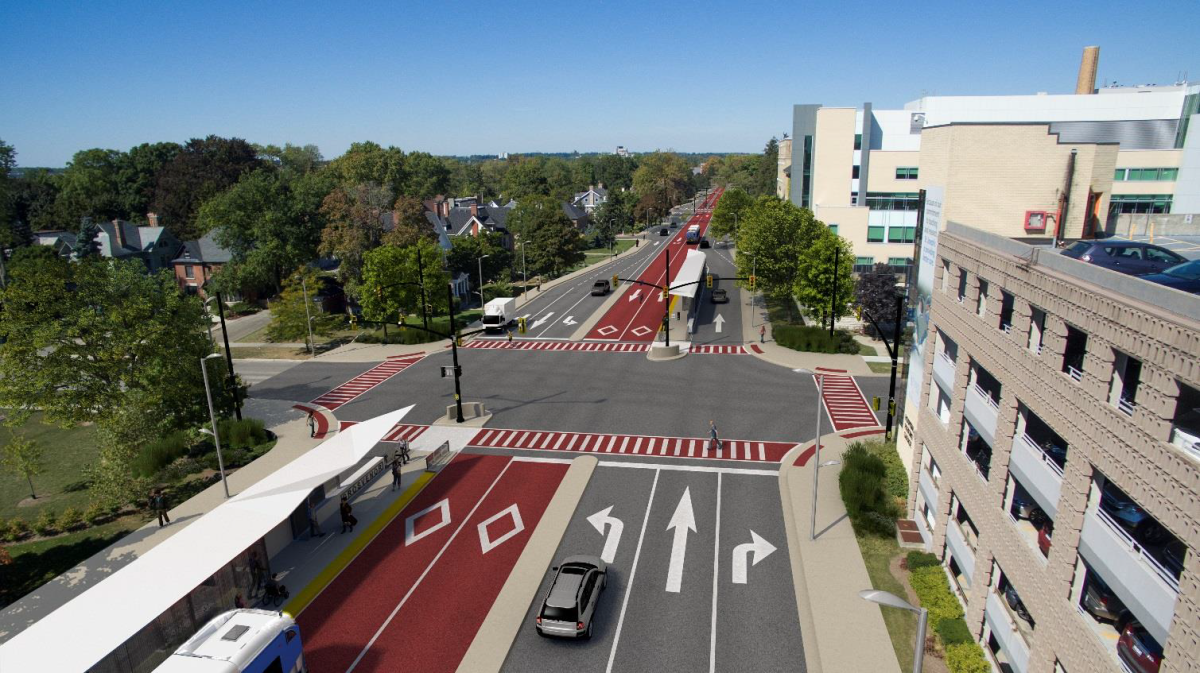Staff recommendations for rapid transit options in London’s west and north corridors were met with mixed reactions as some members of the working group argued that it’s time to take action while others expressed frustration with the options presented to them.

The Rapid Transit Implementation Working Group — comprised of several members of city council, representatives of the London Transit Commission, and other city leaders — held its latest meeting on June 30, roughly six months after its previous meeting on Jan. 27. At Tuesday’s meeting, members received reports from staff outlining options for the north and west corridors, which are the two sections of the city removed from the existing bus rapid transit strategy.
The city previously secured funding from upper levels of government for 10 transit initiatives, but as Mayor Ed Holder explained on Tuesday, “we do not want to leave money on the table from the provincial federal governments that are available for, as they would say back then, transformational transit-related projects.”
“That’s what prompted the initiatives from councillors both in the west, north end of London to challenge staff to come up with a list of projects,” said Holder.
“What I anticipate when we’re ready to deal with this, is that we will have a number of projects, not unlike those that we considered when we as a council approved those 10, but that there will be a series of projects that will be in front of us for consideration, at which time we will put our best efforts together.”
For the north corridor, staff outlined three options: intersection improvements on Western Road and Richmond Street, rapid transit on Western and intersection improvements on Richmond, or rapid transit on Richmond and intersection improvements on Western.
Options for the west corridor were divided into four segments along Oxford Road and the downtown loop. The options for each segment include items like road widening, intersection improvements and prioritizing transit signals. The recommended options involve using the original design plans for segments one and two: having a dedicated westbound lane for buses on Oxford Street heading west from Richmond, and then widening the road in the Cherryhill Mall area and adding two centre-running transit-only lanes for buses.
The recommendations for the remaining segments involve intersection improvements and right-turn lane additions or extensions for buses in segment three in the Wonderland and Oxford commercial area, and extending rapid transit service in mixed traffic with no changes to road infrastructure along segment four, which runs along Oxford through Oakridge and Riverbend.
Councillors Phil Squire and Steve Lehmen expressed frustration with options raised at Tuesday’s meeting, noting the similarities between the options presented and the initial north and west legs of bus rapid transit that council previously rejected.
“I didn’t get what I expected when I made the motion. I was looking for other options, not the same consultants who come back with the same ideas as before,” said Lehman.
“The report itself is beyond the jurisdiction of staff and was not in proper response to the motion that was brought. I have nothing more to say at this time but I hope that is accepted as being a very strong, strong statement,” said Squire.

Deputy mayor and councillor Jesse Helmer argued that the city has been talking about improving transit in the city’s west end for nearly a decade and could end up with little to show for it.
“The first report on the list of reports for this agenda item is dated 2012 and it is the transportation master plan,” said Helmer.
“We’re facing a situation now where we’ll have gone basically 10 years between transportation master plans and having spent virtually the entire time talking about doing something in the west and potentially not having actually done anything.”
Helmer also noted that transit projects “tend to get more expensive” the longer they’re put off.
“When we’re looking at the infrastructure funding, really, the question is: where is transit demand high enough that you need to do major capital works to improve it? Because a lot of cases you can just add buses and change routes and you don’t really need a whole lot of capital funding to do that,” he said.
“I think we can ask the question a lot but the answer is gonna keep coming back the same. If these are the places that are generating a lot of the trips, these are gonna be the places that are generating a lot of the trips. And there’s no real way around that.”
Coun. Maureen Cassidy, who chairs the working group, added that the novel coronavirus pandemic has highlighted the importance of transit within the community.
“We’ve recognized how important transit is when we see the people that rely on transit, they have that need financially to rely on transit,” said Cassidy.
“They’re among some of our lowest paid and yet they are the ones that we really relied on during the shutdown when all businesses were shut down. The people working in our grocery stores, the people cleaning the facilities, our health-care workers — these were the people that needed transit to get around.”
Cassidy says prioritizing transit is a difficult conversation but a necessary one and also thanked the London Transit Commission (LTC) for keeping service running amid the pandemic.
In a series of split votes, members of the working group voted to receive the reports from staff.










Comments